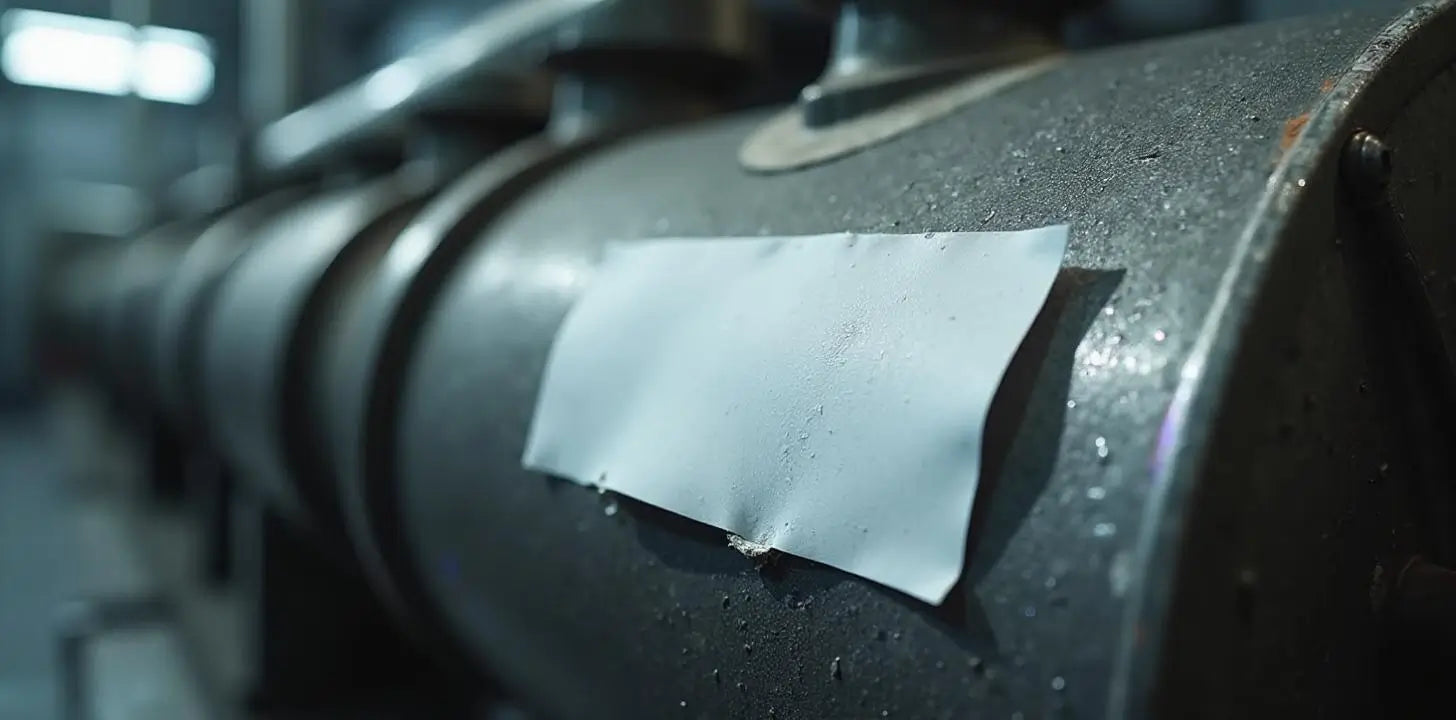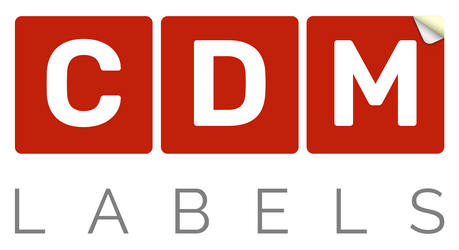
Why Polyester Labels Are Ideal for Harsh Environments
In industries where labels are exposed to heat, moisture, chemicals, abrasion, and UV light, choosing the right labelling material is more than a matter of appearance; it’s essential for operational efficiency and compliance. Faded, peeling, or unreadable labels can lead to serious safety, legal, and logistical issues.
This is where polyester labels come into their own. Polyester labels are ideal for harsh environments because they resist heat, moisture, chemicals, and abrasion. Unlike paper or vinyl, they stay intact and legible in extreme conditions, making them perfect for industrial, chemical, and outdoor use.
At CDM Labels, we specialise in providing high-performance labelling solutions for demanding environments. In this blog, we explore why polyester is the go-to label material when conditions are tough and why it might be the right choice for your business.
What Is Considered a “Harsh Environment” for Labels?
Before understanding the benefits of polyester labels, it’s important to define what we mean by a harsh environment.
Common challenging conditions include:
- Extreme temperatures - such as freezer storage or high-heat machinery
- UV exposure - common in outdoor and sunlit applications
- Chemical contact - solvents, oils, alcohols, detergents
- Moisture or water immersion - indoor damp conditions or full outdoor exposure
- Abrasion and friction - movement across surfaces or rough handling
- Industries regularly dealing with these elements include food processing, automotive, aerospace, electronics, chemical manufacturing, pharmaceuticals, and logistics. If you operate in any of these sectors, your labels need to last, not just stick.
Polyester vs Other Label Materials
There are various label materials on the market, including paper, vinyl, polypropylene, and polyester. Each has its place, but only polyester consistently performs in hostile environments.
|
Material |
Temperature Tolerance |
Water Resistance |
Chemical Resistance |
Tear Strength |
|
Paper |
Low |
Poor |
Poor |
Low |
|
Polypropylene (PP) |
Moderate |
Good |
Moderate |
Moderate |
|
Vinyl |
Moderate |
Good |
Moderate |
Moderate |
|
Polyester (PET) |
High (-40°C to +150°C) |
Excellent |
Excellent |
High |
Polyester labels offer the ideal balance of rigidity, print quality, and resistance to the environmental factors that typically cause other labels to degrade over time.
The Science Behind Polyester Durability
Polyester (PET) is a synthetic film material composed of thermoplastic polymers that provide:
- Dimensional stability: Polyester labels do not stretch, shrink or distort, even under high temperatures.
- Tear resistance: The molecular structure resists tearing, making them perfect for high-abrasion applications.
- Moisture and chemical resistance: The PET surface and adhesive backing resist solvents, oils, and water.
- UV durability: With a UV-resistant topcoat, polyester labels stay legible even with long-term sun exposure.
- CDM Labels provides polyester materials that can be printed with thermal transfer ribbons or digital ink, ensuring crisp, smudge-proof text, even in harsh settings.
Meeting Compliance and Industry Standards
In industries governed by strict regulations, labels must do more than survive—they must comply with legal and safety standards.
Polyester labels are commonly used to meet:
- BS5609 (Sections 2 and 3) – For chemical drum labels that may be exposed to seawater.
- UL 969 – For durable marking and labelling systems in electrical and electronic products.
- RoHS & REACH – For safe and compliant use in electronics and consumer goods.
- At CDM Labels, we source and manufacture polyester labels that conform to these standards, offering peace of mind for health & safety officers, compliance managers, and procurement teams alike.
Real-World Applications from CDM Labels
Our polyester labelling solutions have been tried, tested, and proven across countless harsh environments.
Chemical Storage & Distribution
One of our clients in the chemical sector required durable drum labels that could withstand marine transport and rough warehouse conditions. Polyester labels printed with resin thermal-transfer ribbons passed BS5609 certification and remained intact even after prolonged seawater immersion.
Distillery Cold Storage
A Scottish whisky distillery faced issues with asset labels peeling off in deep freeze conditions. Our team provided high-tack polyester labels that maintained adhesion and legibility at temperatures below -20°C, solving the tracking problem efficiently.
Automotive Components
Under the bonnet, labels must resist heat, oil, and vibration. CDM Labels supplied durable silver polyester tags for an OEM client, ensuring traceability remained intact throughout the product lifecycle.
Choosing the Right Adhesive and Finish
Polyester is only one part of the solution. To perform in harsh environments, the adhesive and finish also need to be fit for purpose.
Adhesive Options:
- Standard permanent: Suitable for most smooth surfaces
- High-tack: Ideal for rough, textured, or low-energy surfaces like plastics and powder coatings
- Removable: For temporary use without residue (e.g., manufacturing stages)
Finish Options:
- Gloss polyester: High clarity, professional appearance
- Matt polyester: Non-reflective for barcodes and industrial readability
- Silver polyester: Metallic look for asset tags and equipment labelling
- Over-lamination: Adds extra resistance to abrasion and harsh cleaning processes
CDM Labels offers a wide range of combinations to suit specific use cases. Our technical team will guide you to the best match for your application.
Best Practices for Printing and Application
Even the best materials won’t last if printing and application are handled poorly. Here are our top recommendations:
Printing:
- Use resin thermal-transfer ribbons for maximum durability
- Match ribbon type to label coating (gloss, matt, silver)
- Allow proper dwell time for the ink to set before handling
Application:
- Clean the surface thoroughly with isopropyl alcohol
- Ensure surface is dry, smooth, and above the minimum temperature (typically >10°C)
- Apply firm, even pressure for 5–10 seconds
- Avoid touching the adhesive during handling
- CDM Labels provides guidance sheets and print samples to help clients optimise labelling success.
Sustainable Options with Polyester Labels
Sustainability is an increasing concern across all sectors. While polyester is a synthetic material, eco-conscious choices are available.
Eco-friendly options include:
- PET liners made from recycled content
- Solvent-free adhesive formulations
- Minimising waste by choosing long-lasting labels that reduce replacement needs
At CDM Labels, we’re always reviewing our material suppliers to align with environmental best practices and evolving customer priorities.
Conclusion: Why Choose Polyester Labels from CDM Labels?
When durability, compliance, and performance matter, polyester labels are the clear winner. They:
- Withstand exposure to heat, chemicals, water, and abrasion
- Comply with essential industrial regulations
- Offer custom finishes and adhesives tailored to your environment
- Maintain print clarity and legibility under pressure
- Help reduce waste with fewer replacements
Whether you need labels that withstand extreme temperatures, resist chemicals, or stay put in wet or abrasive environments, CDM Labels has you covered.
Our polyester label range is built for reliability, designed to perform where standard materials fail. With a variety of finishes, adhesives, and customisation options, you’ll find a solution tailored to your industry and application.

